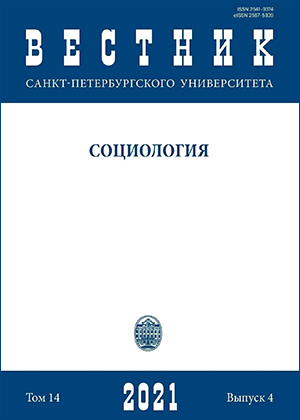Virtualization of society: “Cyberprosthetics” of social interaction
DOI:
https://doi.org/10.21638/spbu12.2021.404Abstract
The problem of virtualization of institutional forms of social interaction is not new, but it continues to remain relevant today in the context of the emergence of new information and digital tools. Social changes caused by social virtualization are manifested in the main spheres of life of a representative of the information society of the 21st century: in economics, politics, science, and culture. Information flow, digital technologies, and network “cobwebs” are embedded in the “core” of social interaction, forming a “cyber-skeleton” inside it, which, replacing real objects and actions with images, modifies the model of social relationships. The author conducts a theoretical study, during which the concept of social virtualization is clarified in the context of new social realities, some approaches to understanding the virtualization of society are considered and systematized, and the key characteristics of virtual reality are revised.
Through the combined consideration of the theories of social virtualization by D.V.Ivanov and social interaction by P.A. Sorokin, conclusions are drawn about how social virtualization affects the institutional forms of interaction: namely, how the structure of social interaction is modified in the context of virtual space. Sorokin’s model of social action “subject — actor — conductor” is being transformed, and the “conductor” link is giving way to “cyber-channel,” which is presented as a tool for organizing spatial communication through new information and digital technologies (for example, social networks). Since virtualization as a global social process primarily consists of the local transformation of individual forms of social interactions, the article provides a number of author’s examples of “cyberprosthetic”, gradually transformed individual segments of public life by means of transition to virtual space, forms of everyday practices of representatives of the modern information society — virtual shop, virtual cemetery, virtual love.
Keywords:
sociology of the information society, virtualization of society, transformation of social interaction, virtual reality
Downloads
References
References
Downloads
Published
How to Cite
Issue
Section
License
Articles of "Vestnik of Saint Petersburg University. Sociology" are open access distributed under the terms of the License Agreement with Saint Petersburg State University, which permits to the authors unrestricted distribution and self-archiving free of charge.




